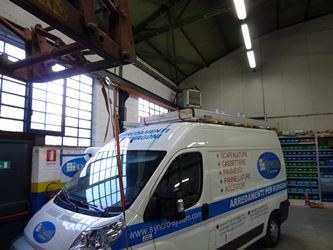SYNCRO NEW ZEALAND: CERTIFIED QUALITY
The products sold and installed at Syncro System’s Auckland centre are covered by a Syncro System warranty and are certified safe by the prestigious TÜV Rheinland certification body.
Two separate product certifications guarantee the safety of Syncro racking and accessories:
- GS (Geprüfte Sicherheit – proven safety) certification for racking, awarded after a van fitted with Syncro racking was crash tested according to ECE R17 standard.
- GS certification for roof racks, awarded after Syncro roof bars and roof racks were tested for load and stress resistance.
What did the tests involve?
Crash testing of racking
This test was performed at TÜV’s offices in Cologne, Germany. A van fitted with 135 kg of Syncro racking and accessories and loaded with 270 kg of tools and materials was driven into a rigid barrier at a speed of around 50 km/h. The test accurately simulated a typical head-on collision in order to assess its effects. TUV’s experts were able to see that, while the racking was subject to some deformation, it retained its cargo safely and therefore presented no risk to the van’s driver or passengers.
Braking, torsion and traction testing of roof racks
Three vans fitted with Syncro System roof racks, including the patented Supersilent aerodynamic profiles, were subjected to a series of tests at the offices of TÜV Rheinland Italy to verify roof rack safety under extreme stress. Three types of test were performed: a stress test in which the roof rack was subjected to a lifting force of 255 kg for 10 minutes, a frontal and lateral traction test in which forces of 200, 400, 600 and 800 kg were applied and a braking test from 80 km/h to zero.
The results were more than satisfactory: no deformation or damage was found in the roof racks themselves, their attachments or the vehicles.
Lashing strap certification
All the straps used in Syncro System cargo retaining systems are homologated to DIN EN 12 195-2 standard, which establishes the requirements for lashing straps made from chemical fibres. The standard also requires all straps to be identified by labels giving their technical specifications, including load capacity and material.
Hook testing
Some Syncro hooks, and in particular the ROTAL-GNC, ROTAL-GNC.AN and GNBC models, have been subjected to resistance testing according to ISO 27956:2009, the standard that establishes the requirements and test methods for cargo restraining points in vans. All tests were passed easily, confirming the specifications declared by Syncro System.













